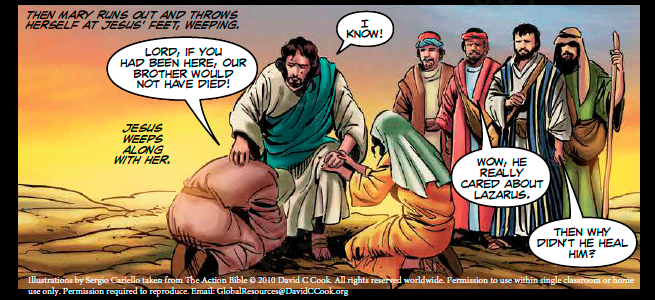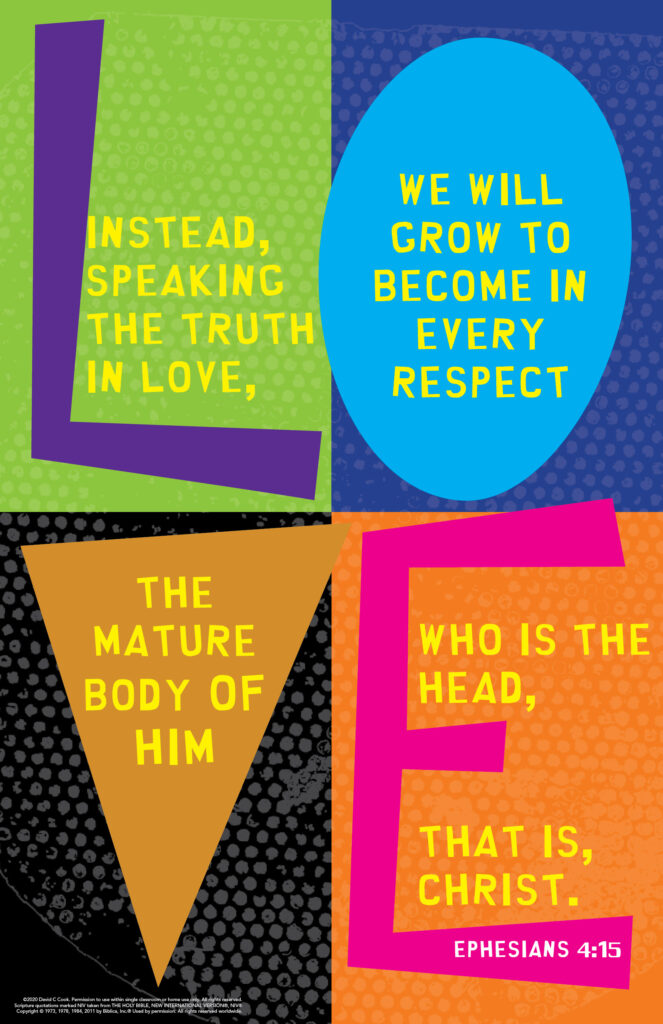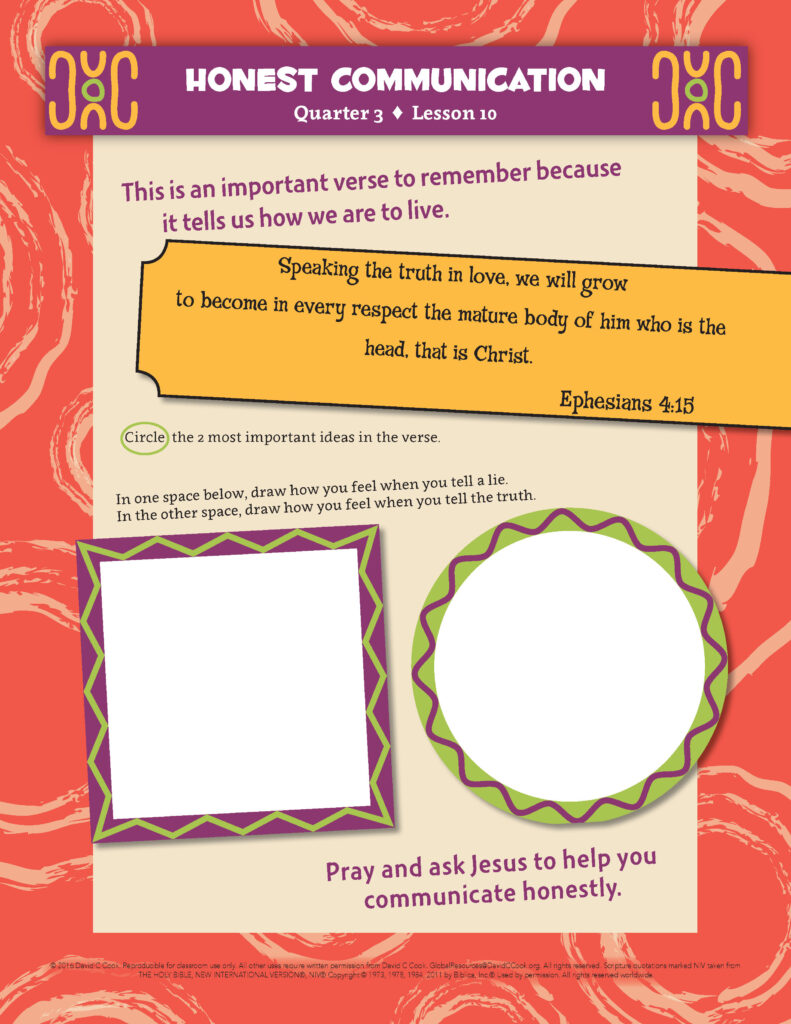During the lesson, the information for you to know is written in regular type, and what we suggest speaking or reading aloud to children is in bold. All resources for this lesson, including the Teacher Guide, Student Page, Family Connection Card, and other resources can be downloaded in a ZIP file by clicking on the following link:
In some lessons you will find "resource articles." These are articles written by experts from around the world to help equip you for your work with children and adolescents. Share them with parents or guardians if you consider it appropriate.
“Lord,” Martha said to Jesus, “if you had been here, my brother would not have died.”… When Mary reached the place where Jesus was and saw him, she fell at his feet and said, “Lord, if you had been here, my brother would not have died.”
John 11:21, 32
Martha and Mary told Jesus exactly what they were thinking. This took courage because women in that day did not speak to a teacher the way they did. But they did not pretend that things were okay when things were not. They did not understand why Jesus chose to stay away when their brother was sick. They spoke honestly even when it may have been difficult to do so. And how did Jesus respond? He listened and had compassion on them.
As you prepare your heart to teach, follow Martha and Mary’s example. Spend time in honest prayer with God. Tell Him exactly what you are thinking and how you are feeling. Ask Him to show you if there are areas of your life where you have been dishonest, either with what you were feeling and thinking or something else. Spend time allowing Him to show you areas where you have not been honest. As you repent, ask Him to give you courage to always be honest with Him, yourself, and others.
Let the family members of your students know that the children are learning this week that honesty matters. They can talk with their children about why it is important to be honest and what can happen when someone is dishonest.
Teacher Tip: If possible, email or text the Family Connection Card to the families of your students.
As your children arrive, explain that you will play a game about truth and lies. Tell them 3 interesting things about yourself. Two of the things will be true and 1 will be a lie. If there is another adult helping you, have him come up with 3 things to share as well. Try to have all 3 things seem believable but unusual. Try to trick the children with a statement that seems true, but is not.
For example you could say:
Note: All 3 statements are interesting and all 3 could be true, but in the game, 1 of them is not true. Share your 3 interesting things twice. Then ask the children to vote on which statement they think is the lie. Tell them which statement is the lie and clap for those who correctly guessed it.
Often it can be impossible to tell if someone is lying, especially if that person lies a lot.
Share a well-known story with the children about someone lying and receiving a difficult consequence. It could be a myth, a fable, or a story from history or the news that is familiar to your children. Then ask the following questions:
When people are honest, others are more likely to trust them. When people lie, others stop trusting them. It becomes hard to keep friends and to have healthy relationships. Through the years, many government and business leaders have lost their friends, positions, and reputations when others learned they had been dishonest.
It is not always easy to tell if a person is telling the truth or not. Honesty is something that people usually expect. When people lie, they lose a person’s trust. To gain it back they will have to prove themselves again and again before they are believed. It is easier to lose trust than it is to gain it back. Sometimes people may lie because they feel there is a barrier to them telling the truth.
Allow the children to offer their ideas before continuing.
A barrier is a stumbling block. For example, a large piece of wood in front of a door is a barrier that prevents people from going in or out of the door. In the case of honesty, a barrier might be something that makes us afraid to tell the truth.
Answers might be if you are afraid, if you think someone may be hurt, or other ideas. People may lie because they do not want to look bad to their friends or because they think a lie might make them seem better than they are. One of the most common barriers to telling the truth is being afraid of getting into trouble.
Although sometimes it seems like lying is the only way out of difficulty, it is never a good decision. Being honest takes courage. We must have the courage to do what seems hard now because we know it is right and will be best in the long run.
Being honest is often hard. Sometimes it takes courage to be honest. I am going to tell you a true story from the Bible about 2 sisters, named Mary and Martha. Pay attention to how they talk with Jesus. Are they honest or dishonest with Him? Do they tell Him exactly what they are thinking, or do they hold back?
Optional: If you are using The Action Bible, have the children read the story on pages 604–606 before you tell the story to them.
A man named Lazarus was sick. He was the brother of Mary and Martha and a close friend of Jesus. Jesus was teaching in another town, so the sisters sent Him a message saying that Lazarus was sick. Jesus stayed where He was for 2 days after He heard the message.
In the meantime, Lazarus died. The message of his death had not yet reached Jesus, but still Jesus knew he had died. Jesus and His disciples went to the town where these friends lived. When Martha heard He was coming, she ran out to meet Him while Mary stayed at home. Listen to what Martha said to Jesus when she saw Him.
If possible, read John 11:21 from your Bible. Show the Action Bible image of Martha if possible.

“Lord,” Martha said to Jesus, “if you had been here, my brother would not have died.”
John 11:21
Martha must have been very sad and upset. Her brother was dead! She knew that Jesus had the power to heal sick people, but He had not arrived in time to heal Lazarus. Martha was very honest with Jesus, which took courage. Most women in this culture did not talk to men so openly, and they could get in trouble for doing so. But Martha told Jesus exactly what she was thinking! Jesus did not rebuke her. He did not embarrass her. Jesus simply listened.
A little while later, Mary went out to meet Jesus. Listen to what Mary said to Jesus when she saw Him.
Read John 11:32. Show the Action Bible image of Mary if possible.
When Mary reached the place where Jesus was and saw him, she fell at his feet and said, “Lord, if you had been here, my brother would not have died.”
John 11:32

Like Martha, Mary was honest with Jesus. It took courage for her to speak so openly, but she trusted Jesus. Jesus listened and had compassion on her.
Jesus asked the people to take him where Lazarus’ body had been laid. Jesus cared so deeply about Lazarus and his sisters that He wept. Jesus allowed other people to see His sorrow.
Help the children see that He felt emotions like we do.
Jesus felt great compassion for Mary, Martha, and their friends. He prayed to His Father in heaven and then called Lazarus out of the tomb. Jesus brought Lazarus back from the dead!
Many people saw how Jesus responded to Mary and Martha’s honesty that day. They saw Jesus weep, and they saw His compassion and power when He called Lazarus out of the tomb. As a result, many people started believing in Jesus that day.
Martha and Mary were honest about their feelings with Jesus. Throughout the Bible, we see other men and women telling God their thoughts and feelings. God wants us to be honest with Him. And He wants us to be honest with ourselves and others too.
Lying is a lot like rolling a stone or ball down a hill. Once you give it a push, it rolls faster and faster and becomes hard to stop. Often when you tell a lie then you have to tell more lies to cover up the first lie. It becomes hard to stop lying. You feel trapped. In the end you have a long string of lies, and those lies will eventually trap you.
You can always turn to God when you feel trapped into telling a lie. He will help you find a way out. A trusted adult also can help you if you are in a situation where you want to lie. Caring adults have years of wisdom and will be able to help you figure out the right thing to do without turning to lies.
Speaking the truth in love, we will grow to become in every respect the mature body of him who is the head, that is Christ.
Ephesians 4:15

God always knows when we are not being honest, so even if you can fool a person for a time, you will never be able to fool God. Before you can choose to have courage to be honest, it is important to recognize the ways you are being dishonest. Let’s spend a few minutes thinking about the dishonesty in our own lives. I am going to ask some questions. After each, think quietly about it. You do not have to speak. Your answers are just between you and God.
Wait several seconds after each question to give the children time to think.
If you are ready, spend a few moments telling God you are sorry for lying and being dishonest. Ask Him to forgive you. Ask Him to give you the courage to be honest from now on. If you are not yet ready to talk with God, spend a few moments thinking of ways you can be honest.
Allow the children a few moments of silence to pray and think. Then do this exercise with the children.
Have the children sit still and make a very tight fist with 1 hand. Have them concentrate on how it feels to hold that fist tight—are their hands getting tired or do they feel stressed or tense? While they continue to hold a fist, have them keep the other hand open and relaxed. How does that feel?
Explain that telling lies can keep us tense and closed off, like their fists. But living in truth feels like the open, relaxed hand. Truth gives us the freedom to be open with people and helps us to relax inside. Let the children think about this idea as they relax both hands, paying attention to how that release feels.
It is important to be honest with God, and it is important to be honest with other people. Being honest with others often takes courage. Sometimes, though, there are barriers to being honest like we talked about at the beginning of class. If you have barriers that might keep you from being honest with someone in your life, you can come tell me or another trusted adult. We will pray with you and help you.
Optional:
Give each child a piece of paper. On one side she will draw a picture of how lying makes her feel. On the other side, she will draw a picture of how telling the truth makes her feel.
If you are using the Student Pages, give the children a couple of minutes to respond on them.
End of Option

End class by praying this blessing based on Luke 6:45 over the children:
Blessing: May God give you the courage to be honest. May He fill you with His truth so that the words you speak come from the overflow of goodness in your heart.
Lead the children in singing this quarter’s song if possible.
Life on Life ©2020 David C Cook. Reproducible for home or classroom use only. All other uses require written permission from David C Cook [email protected]. All rights reserved.